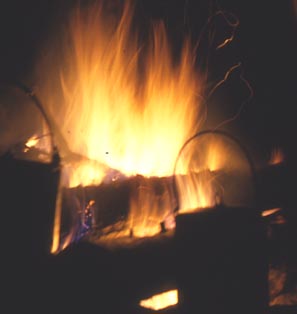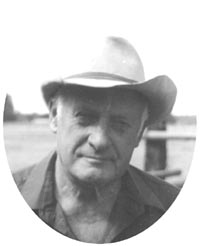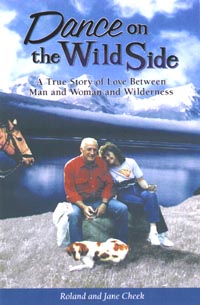a weblog sharing info on outdoor skills and campfire musing by a guy who spends a bunch of time in pursuit of both
CULTURE
WHERE -
TALES ARE TOLD OF
Welcome to Roland Cheek's Weblog
Roland is a gifted writer with a knack for clarifying reality. Looking forward to more of his wisdom
- Carl Hanner e-mail
I've wondered about this thing called AUTHORITY: its nature, origin, base or bases; authority whether innate or acquired? If acquired, then by what means? Authority as opposed to mere POWER, how exactly to be defined? What of the development of the word itself? It's author? Adolf Hitler had enormous POWER; Mohandas Gandhi had enormous AUTHORITY (even without Hitler-like POWER). Yet which one of the two had more influence on posterity? An interesting question. Help me understand.
To access Roland's weblog and column archives
Tip o' the Day
The guy said he wanted to pick my brain. I told him he wouldn't need more than a few seconds. He said he and his wife and another couple wanted to pack by horse into the Bob Marshall Wilderness for a few days during the coming summer. "We'd like to go in on June 21st and come out July 1."
"That pretty well limits you to the valley bottoms," I said.
"Valley bottoms? I don't understand."
"The high passes will still be blocked by snow in late June."
"When, then, should we visit the Bob?" he asked.
"It depends on what your group's objectives are. For instance, if fishing is top priority you'll need different guidance than if viewing the splendors of the high country is your chief goal. If you wish to avoid other people, you'll need to choose a different itinerary and timing than otherwise.
Might they wish to view wildflowers at their zenith? Or how about wildlife?
How many horses will their party employ? What about horsefeed?
Then there are bugs: horseflies, mosquitos, ticks during season.
Trail opening times should be considered. A discussion of trail flow patterns could be important, depending on their itinerary: the cliff trail along Gibson Reservoir is an excellent example, as is the Holland Lake Trail that has loose rules about travel direction and times. Either have places that can be dangerous for parties to meet.
Water crossings is another topic worthy of close scrutiny. Generally we're talking of crossings during spring run-off (May-June). But past records disclose that travelers have drowned attempting Bob Marshall water crossings in July and October, as well as May and June.
The guy picking my brain said his group would like to do all the above.
"So would I," I told him. "But I've spent most of a lifetime trying to do that very thing. And there's still places I haven't seen.
Uh-oh! I've ran out of space. So let's continue this discussion on visiting "the Bob" next week. Plan to continue....
BACKPACK VS HORSEPACK--A CONUNDRUM
During the Stone Age--say the early 1970s--debate raged about the efficacy of allowing horses on trails in Rocky Mountain wilderness areas. There were the few hikers who flat didn't like to see pony poop where they wished to place their hiking boots. Other hikers were persuaded that horses rutted trails, girdled trees, grazed meadows to dirt.
Some horse users returned vile opinions like boomerangs: Hikers cut switchbacks, tramped parallel trails through alpine meadows, carved Lucy Loves Louie on trees.
Fortunately calmer heads prevailed and today the only grumbling about whether horses and mules should be permitted on trails in the Northern Rockies is heard from California visitors or, in moments of vexation, by the horsemen themselves.
Having engaged in both hiking and horsepacking, I'll presume to summarize problems inherent with each:
If there are hikers out there who think horse packing is for the leisure class, all I can say is they haven't tried it. Mantying packs, slinging same, and keeping them atop animals anxious to displace anything waved in their direction, takes the strength of Hercules, patience of Job, watchfulness of Odysseus, and memory of Homer.
Even if aficionados of backpacking must trudge for miles up steep switchback trails with 50 pounds on their backs, backpacking is easier. Consider that the horseman is out at three in the morning running ponies in from a forty-acre pasture in order to load them into a dilapidated trailer hitched to an underpowered pickup truck to grind for five hours in low gear through boulder-strewn passes. Then he must unload ponies and somehow turn a trailer and pickup around on a narrow cliffhanger road, then find a place to park so his rig won't be shoved over the side by the first 18-wheeler to roar past.
Then they must grain and brush and saddle and pack and trail-out a bunch of rangy, half-broke, four-year-old packages of Dupont dynamite, nurse them through shintangle that would balk an elephant, and somehow guide them for twelve hours along a trail infested by (in their eyes) rock bears, tree bears, brush bears, and sometimes even, bear bears.
The lucky backpacker, mind you, left home after a leisurely brunch and wheeled his sports car into a trailhead parking lot after a speedy drive along macadam highways. He parks his Porche, locks it, shoulders his backpack and strolls to camp, stopping often to take pictures or ogle the overtures. He drinks water from rushing mountain streams that he first purifies with his water filter while soaking his feet because he'd not really broken in his hiking boots as he'd planned. By mid-afternoon, though, the lucky backpacker shrugs from his pack, pops up a tent, rolls out his sleeping bag and his work is largely done.
The poor horseman, on the other hand, arrives at his campsite after dark, weary to the point of falling-down exhaustion. Now he must unload and care for his livestock, set up camp, gather firewood in the dark, cook, and nod off to sleep before taking a bite. Otherwise he's free to enjoy a leisurely evening--all the while worrying that his ponies might recollect a meadow with jucier grass fifteen miles back the way they'd came.
To tell the truth, using horses in the big lonesome is not everything it's cracked up to be. If you're not committed to loving the creatures; if you're keeping animals you don't like and don't care about in order to take that once in a lifetime wilderness trip, why sell 'em and use the money to go with an outfitter who knows the ropes and will do the work.
However, if you're a masochist; if you like the obnoxious, disappointing hooved orangutans; like to care for them and be around them; and if it pleasures you to sit up like King Tut on top of a willing steed carrying you across the prettiest land over which God ever waved a wand; and if long hours and hard work don't dismay you; and if you can say, Hang the expense! Then keeping nags behind the woodshed makes sense
Roland Cheek wrote a syndicated outdoors column (Wild Trails and Tall Tales) for 21 years. The column was carried in 17 daily and weekly newspapers in two states. In addition, he scripted and broadcast a daily radio show (Trails to Outdoor Adventure) that aired on 75 stations from the Atlantic seaboard to the Pacific Ocean. He's also written upwards of 200 magazine articles and 12 fiction and nonfiction books. For more on Roland, visit:
www.rolandcheek.com
Recent Weblogs
Tuesday, January 20, 2009
for more info about these and other Roland Cheek books
There's a bunch of specific info about Roland's books, columns, archives and radio programs. By clicking on the button to the left, one can see Roland's synopsis of each book, read reviews, and even access the first chapter of each of his titles. With Roland's books, there's no reason to buy a "pig in a poke."
for detailed info about each of Roland's books
Read Reviews
Read their first chapters
For interested educators, this weblog is especially applicable for use in history classes, as well as for journalism students.
Roland, of course, visits schools. For more information on his program alternatives, go to:
NEXT WEEK:
FELINE DEPORTMENT
www.campfireculture.com
Too honest to deny its roots in hunting, but too human to be contained by its limits, The Phantom Ghost of Harriet Lou is a book for those who care about wildlife of all kinds.
Check out Roland's office: sun roof, daylight basement, and no parking problems. Short takes, sage wit, large humor, all gleaned from an outdoors lifetime
Good grizzly mother? Or a savage killer. Your choice. An entire book about the life of a single charismatic grizzly bear
9 X 12 coffee table book about the best loved chunk of wild country in America: the place? Montana's Bob Marshall Wilderness . . . When? Then and now -- and always will be -- the way God made it.
source links for additional info
to send this weblog to a friend
to tell Roland what you think of his Campfire Culture weblog
to visit Roland's newspaper columns and weblog archives
To learn more of Roland's & Jane's exciting life as outfitters and guides in the Bob Marshall Wilderness, read Dance On the Wild Side
Learning To Talk Bear is Roland Cheek's best selling book -- now in it's 5th printing.
Safety in bear country? Of course! But this book also teaches the reader about the animals themselves.








